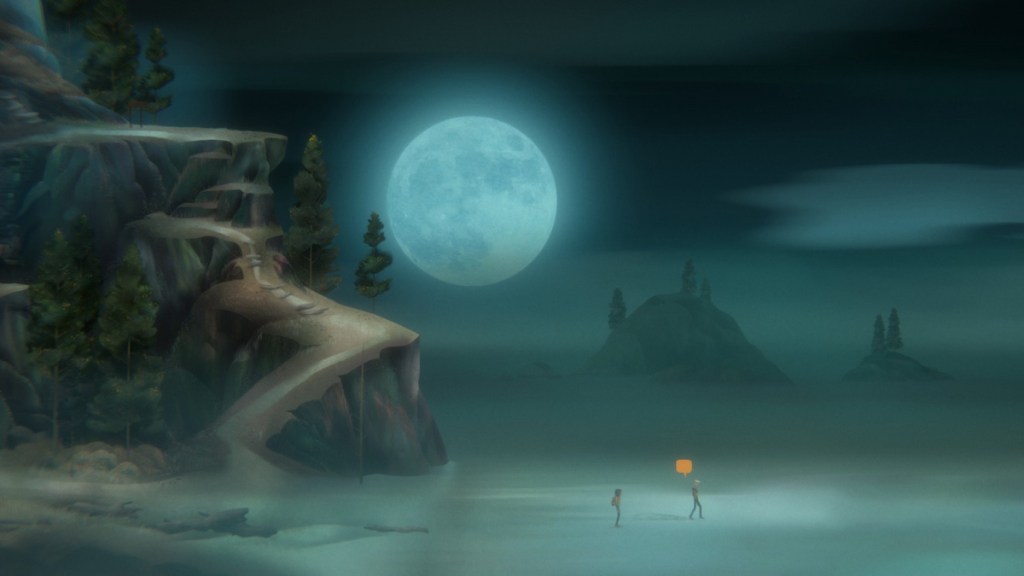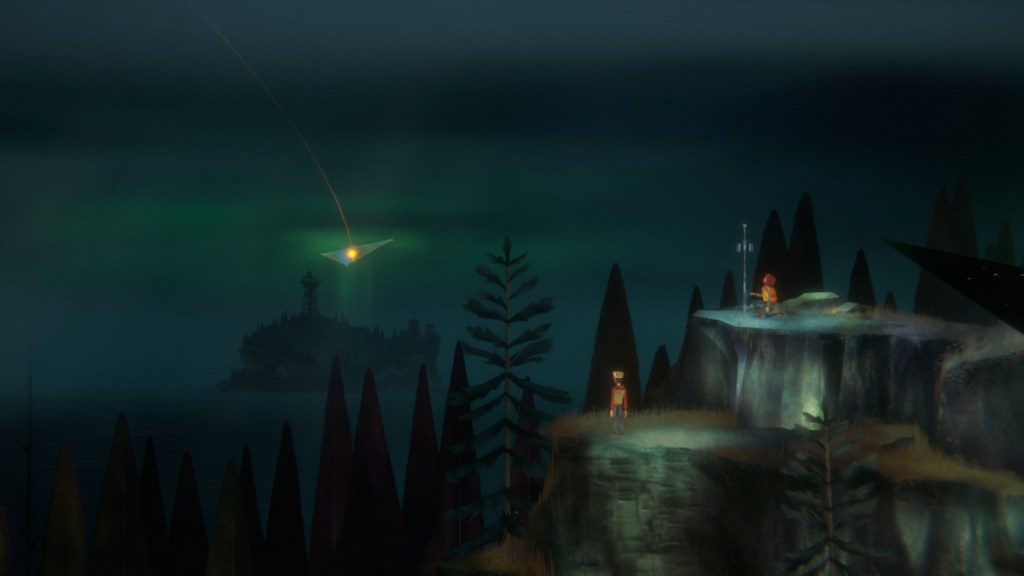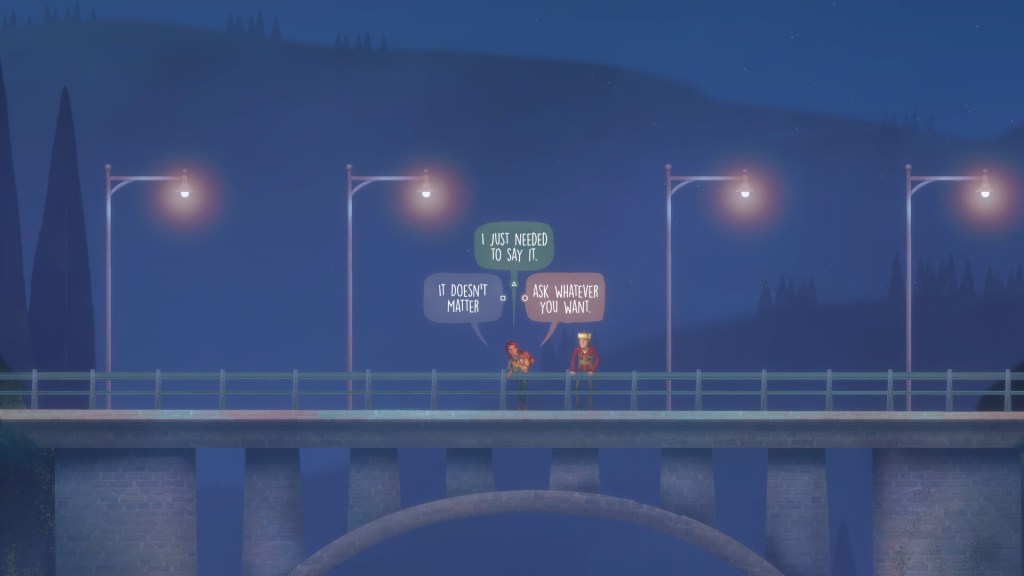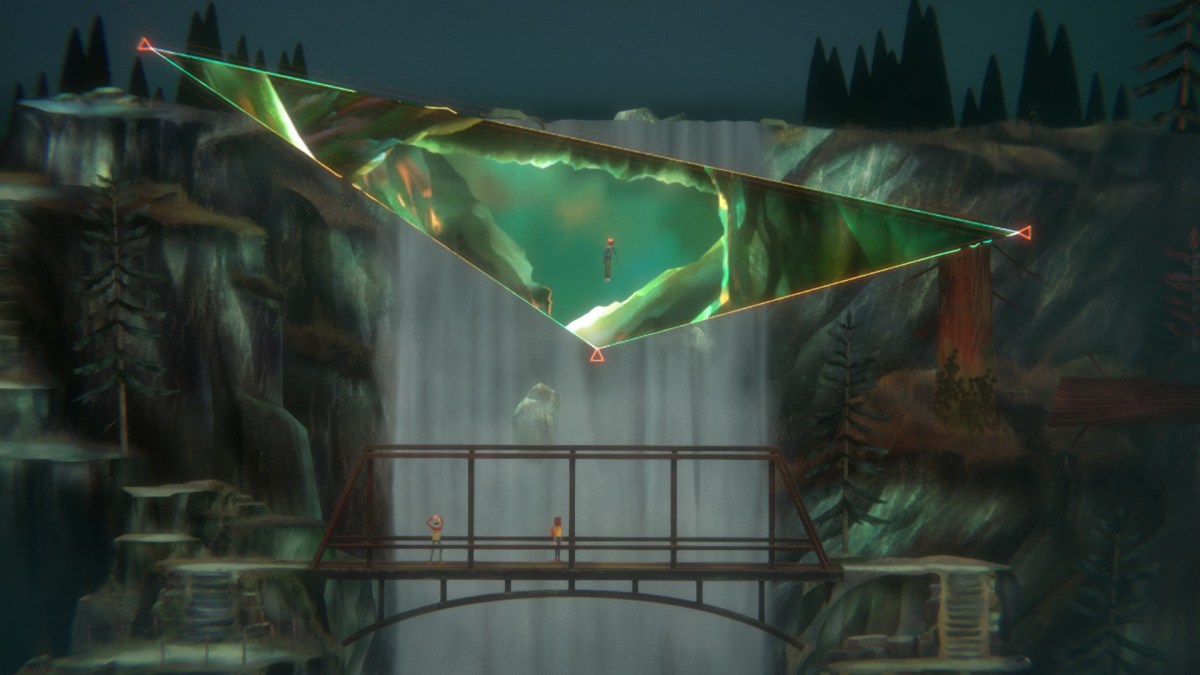The past few years have ushered in a wave of games that I tend to describe as “creepy-cozy” — titles like Graveyard Keeper, Strange Horticulture, Cult of the Lamb, Beacon Pines, and Dredge, all of which take elements from the horror and mystery genres and blend them into otherwise pleasant, relaxing atmospheres. The concept itself isn’t exactly new, however. Plenty of people have long preferred their “cozy” games to be served with a side of darkness or, alternatively, their “scary” games to be buffered by a sense of consistent comfort in certain aspects. In the case of Oxenfree II: Lost Signals, the pervading sense of “coziness” isn’t derived from cute aesthetics or a soothing loop of life simulation gameplay; instead, it stems from interactions between Riley and Jacob, the game’s main characters.
Unless you opt to ignore every dialogue prompt and render Riley a near-silent protagonist, she and Jacob spend a lot of time in conversation. After all, when saving the world from time-traveling ghosts happens to involve long, scenic walks along the coast with your new coworker, you’re bound to engage in some small talk despite the spooky circumstances. Between all the thrills and chills Oxenfree II’s plot has to offer, there is a vast expanse of quiet intimacy centered on these two individuals who are getting to know each other — sharing amusing anecdotes, recounting relationship struggles, and mulling over regrets and hopes for the future — over the course of one fateful evening.

Image via The Escapist
Oxenfree II: Lost Signals is the long-awaited follow-up to Night School Studio’s Oxenfree, and while being familiar with the original game helps a player to decipher the sequel’s storyline more quickly, Oxenfree II works just fine as a standalone experience. The game opens with Riley Poverly, our jaded but good-natured protagonist, returning to her hometown of Camena after a short-lived stint in the military. Riley’s new job requires her to be a field worker of sorts, aiding an environmental research group in investigating electromagnetic disturbances that are interfering with radios, radar, and other devices in the area.
Shortly after Riley arrives on the scene, these strange electromagnetic signals begin to have more sinister effects — opening rifts into alternate timelines and allowing ghosts who’ve been trapped between dimensions to exert their influence over the present state of reality. Riley and the colleague she’s been paired with, Jacob Summers, are tasked with placing transmitters at various points of high elevation across Camena in hopes of counteracting the wayward signals and closing a portal that threatens to tear their world apart.

Image via The Escapist
Riley and Jacob’s mission sounds daunting, especially with their efforts being thwarted by a local religious group called Parentage, but the bulk of their time is spent walking — trekking along beaches, through woods, past waterfalls, and up cliffs to reach the locations where each transmitter needs to be placed. If it weren’t for the tension and unease underlying Oxenfree II’s narrative, the game would feel downright leisurely due to its slow pace and simple mechanics. The painterly scenery is gorgeous to look at, and the largely linear paths are broken up by gaps to jump across and rock faces to climb. However, the most thoroughly engaging aspect of the game is its dialogue. Riley carries a walkie-talkie to keep in contact with a handful of secondary characters (Shelley is my personal favorite), but in my opinion, her budding companionship with Jacob is the highlight of the game.
I won’t be surprised if Jacob’s character garners mixed reactions from players. He comes across as a bit desperate for Riley to like him, his jokes don’t always land, and he has a habit of breaking silences that are perfectly comfortable. These quirks, though mildly annoying at times, ultimately made him seem more genuine — I know this guy, this endearingly awkward person who’s a bit too excited by the prospect of making a new friend.

Image via Night School Studio
Depending on the responses you select on Riley’s behalf, her chats with Jacob may be humorous, tense, awkward, or emotional, but no matter which options I chose, the resulting conversations were compelling and realistic. Whether Riley and Jacob were playing a game of “One Word Story” to calm their nerves or reminiscing on relationships that changed their lives, the writing was consistently excellent, and the voice actors (Elizabeth Saydah as Riley and Joe Bianco as Jacob) did an outstanding job of imbuing their characters with authentic personalities.
Despite (or perhaps because of) the fact that I’m not a garrulous conversationalist in real life, I had to resist the urge to make Riley spill her guts to Jacob at every opportunity. Juxtaposed with the game’s supernatural scenes, these moments in which Riley articulated her relatable, perfectly ordinary struggles became even more poignant. It feels odd to say that some heartfelt conversation managed to command my attention to an even greater extent than ghosts, cultists, and time travel, but during my time with Oxenfree II: Lost Signals, this was undoubtedly the case.






Published: Jul 16, 2023 12:00 pm